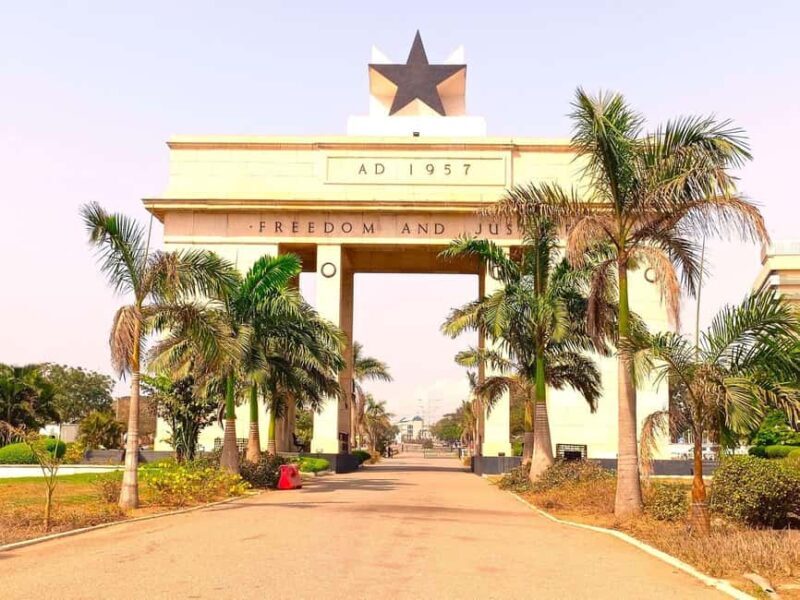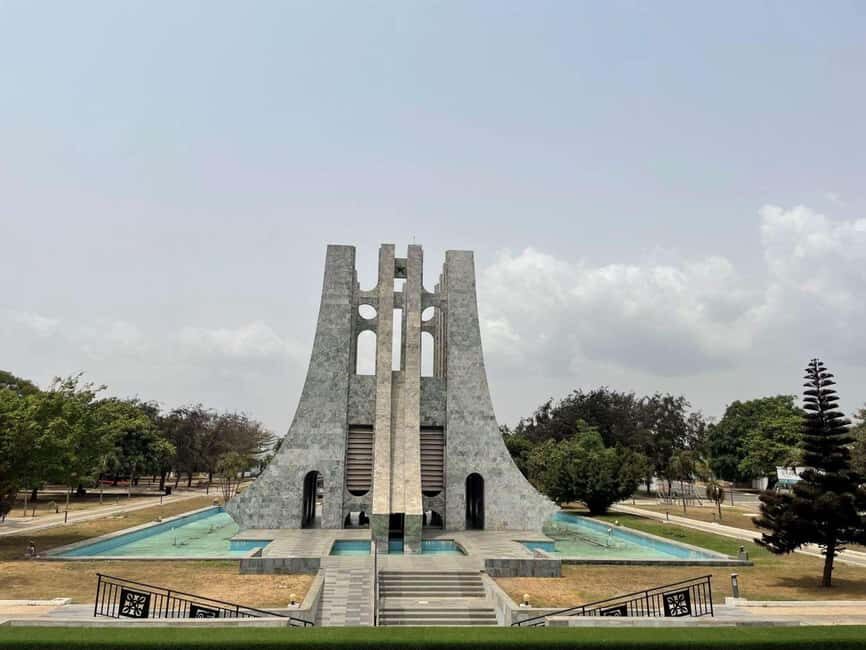Traveling through Ghana in just a few days sounds ambitious, but a well-organized guided tour like this can give you a compelling taste of the country’s vibrant history, diverse culture, and stunning landscapes. This particular 3-day experience from Explore with Didier offers a fascinating mix of urban life, royal traditions, and poignant history, all wrapped into one seamless package.
What stands out most about this tour? First, you get a comprehensive look at Ghana’s capital, Accra, from its bustling markets to its significant landmarks. Second, the chance to explore Kumasi, the heart of the Ashanti Kingdom, with its regal traditions and lively markets, offers a real sense of Ghanaian royalty and resilience. Third, the emotional and historic visit to Cape Coast Castle and Elmina Castle makes history tangible, shedding light on the transatlantic slave trade in a way that’s both respectful and eye-opening.
One possible consideration? The tour involves quite a bit of walking and some emotional sites that might be intense for sensitive visitors. It’s not suited for travelers with mobility impairments or claustrophobia, as some of the historic castles have confined spaces. Still, for those eager to see the highlights and gain authentic insights into Ghana’s past and present, this guided experience offers excellent value.
This tour appeals most to culturally curious travelers, history enthusiasts, and those ready to experience the diverse layers of Ghana in a compact, well-structured itinerary.
- Key Points
- Exploring Accra: The Urban Gateway
- Kumasi: Heart of the Ashanti Kingdom
- Cape Coast: A Haunting Reminder of the Past
- The Practicalities: What to Know Before Booking
- Final Thoughts: Is This Tour Right for You?
- FAQ
- More City Tours in Kumasi
- More Tours in Kumasi
- More Tour Reviews in Kumasi
- Still browsing? Here are more Kumasi experiences we've covered recently
Key Points
- Comprehensive itinerary covering Accra, Kumasi, and Cape Coast within three days.
- Authentic cultural experiences, from markets to royal palaces.
- Historical depth, especially at the castles and slave trade sites.
- Inclusion of rainforest adventure at Kakum National Park.
- Guided tours with entrance fees included, simplifying logistics.
- Ideal for travelers seeking a balanced mix of history, culture, and nature.
Exploring Accra: The Urban Gateway
Starting your journey in Ghana’s lively capital is an excellent way to set the tone for the trip. Accra is a city where modern energy meets deep-rooted history. Our review of the experience highlights that the tour kicks off with a visit to Kwame Nkrumah Memorial Park & Mausoleum. Walking through the serene gardens and the marble mausoleum, you get a profound sense of Ghana’s independence history, with personal artifacts and photographs that bring the story home.
Next, the visit to Independence/Black Star Square offers a quintessential photo op. The iconic Black Star Arch and the square itself symbolize Ghana’s freedom, making it a proud moment for visitors. The tour includes a stroll through Makola Market, renowned for vibrant fabrics, beads, and spices—perfect for amateurs and seasoned shoppers alike. It’s a lively, noisy, and colorful introduction to Ghanaian commerce and craftsmanship.
The historic district of Jamestown adds a colonial charm, with its lighthouse and murals. The guide will probably share stories of the fishing harbor and colonial past, which makes the area feel alive and layered. For a local flavor, the tour suggests trying Ghanaian staples like fufu with groundnut soup or jollof rice at a nearby chop bar—familiar favorites for many and an authentic taste of Ghanaian cuisine.
In the evening, the Arts Centre for National Culture becomes a must-visit for souvenirs, offering carvings, kente cloth, and paintings. Afterward, Osu Oxford Street provides a lively nightlife scene, with rooftop bars and street music, perfect for unwinding after a full day.
Enjoying having a local guide? These other guided experiences in Kumasi might interest you
Kumasi: Heart of the Ashanti Kingdom

Leaving Accra early, the drive to Kumasi is scenic, passing through lush forests and traditional villages. The journey gives a glimpse of Ghana’s rural side amid the urban hub. Once in Kumasi, the focus shifts to the rich heritage of the Ashanti Kingdom. The Manhyia Palace Museum is a highlight, displaying royal regalia, thrones, and photographs of Ashanti kings. The museum’s content, as one reviewer notes, offers “fascinating insights into Ashanti power and resistance,” making it much more than just a palace tour.
Kejetia Market is the largest open-air market in West Africa, boasting over 10,000 stalls. Navigating this maze of fabrics, beads, and gold jewelry provides an authentic sense of daily Ghanaian life. Shoppers will find this bustling market both exciting and overwhelming, but the experience is well worth it. The Prempeh II Jubilee Museum adds a smaller, more focused collection of artifacts, including ceremonial items and royal furniture that reveal the cultural depth of the Ashanti people.
Dinner in Kumasi offers a chance to taste local specialties like fufu with light soup or Omo Tuo (rice balls), often served in relaxed, family-run restaurants. Evening in Kumasi tends to be cooler, and the city’s garden-like streets provide a peaceful backdrop after a day of exploration.
Cape Coast: A Haunting Reminder of the Past

The drive from Kumasi to Cape Coast is about a six-hour trek, but it’s worth every minute. The highlight here is the Cape Coast Castle, a UNESCO World Heritage Site. Guided tours take you through the dungeons where enslaved Africans were held before being shipped across the Atlantic. The experience can be emotionally heavy, but the exhibits and stories foster understanding and reflection.
If time permits, the tour includes a visit to Elmina Castle—the oldest European building in sub-Saharan Africa, built by the Portuguese in 1482. Standing inside these historic structures, you can almost hear the echoes of history, a stark reminder of Africa’s complex past.
The afternoon features a walk along the canopy walkway at Kakum National Park. Suspended at about 30 meters above the forest floor, this walkway offers incredible views of the rainforest. As one reviewer mentions, “up in the canopy, you see monkeys, birds, and endless green,” which makes for a memorable nature experience. Remember to bring insect repellent and wear comfortable shoes—this part of the tour demands some physical activity but rewards with stunning vistas.
The Practicalities: What to Know Before Booking
The tour is priced at $1,000 per person, which, considering guided tours with entrance fees, transport, and organized logistics, offers good value. It’s designed for travelers who want a curated experience without the hassle of planning every detail themselves. The group size tends to be manageable, allowing for personalized attention and easier navigation through busy sites.
Transportation is included, with pickups and drop-offs arranged, so you won’t need to worry about local transports or directions. The tour involves a lot of walking, especially at markets and castles, so comfortable shoes are essential. Expect some emotional moments at the castles, especially at Cape Coast, so mental preparedness can enhance the experience.
The tour operates in multiple languages, including English, French, and Spanish, making it accessible for international visitors. Since you can reserve now and pay later, it offers flexibility—great for travelers finalizing plans.
More Great Tours NearbyFinal Thoughts: Is This Tour Right for You?
This Ghana tour offers a balanced mix of history, culture, and adventure, making it an ideal choice for those who want to experience the country’s highlights efficiently. If you’re passionate about understanding Ghana’s past, exploring royal traditions, and witnessing natural beauty—all within a structured, guided setting—this tour delivers good value.
It’s especially suited for those who prefer guided experiences that cover logistics and entrance fees, allowing you to focus on soaking in the sights and stories. However, be prepared for some emotionally intense moments and a fair amount of walking, so physical readiness is advised.
The tour provides a well-rounded snapshot of Ghana’s soul, making it a meaningful addition to any West Africa itinerary.
FAQ
How many days does the tour last?
It spans 3 days, with guided visits across Accra, Kumasi, and Cape Coast, plus a rainforest adventure.
Are entrance fees included?
Yes, the tour covers entrance fees to Kwame Nkrumah Memorial Park, Manhyia Palace Museum, Cape Coast Castle, and Kakum National Park.
Is transportation provided?
Absolutely, pickups and drop-offs are included, and the entire trip between cities is organized, making travel seamless.
What should I bring for the tour?
Comfortable shoes, a camera, sunscreen, water, and insect repellent are recommended for the walks and outdoor activities.
Can I book now and pay later?
Yes, the booking process allows you to reserve your spot with flexible payment options, including pay later.
Is the tour suitable for everyone?
It’s not recommended for those with mobility issues or claustrophobia due to walking and confined spaces in castles.
This guided Ghana tour packs a lot into three days, blending history, culture, and natural beauty into an accessible, thoughtfully curated experience. Whether you’re a history buff or a curious traveler, it offers a meaningful way to understand Ghana’s diverse identity—all without the stress of planning.
You can check availability for your dates here:More City Tours in Kumasi
More Tours in Kumasi
More Tour Reviews in Kumasi
Still browsing? Here are more Kumasi experiences we've covered recently
- Accra: 2-Day Guided Tour from Accra to Kumasi and Cape Coast
- Accra to Kumasi 2-Day Cultural and Historical Tour
- Kumasi: Golden Stool of the Ashanti Kingdom by Guided Tour
- Kumasi: Zoo Admission Ticket
- Kumasi: City Tour
- A Day in Kumasi
- Kumasi: Manhyia Palace and Museum Guided Tour
- Accra: Ashanti Kingdom Day Trip with Roundtrip Flights
- Accra: Tour and Escape adventure
- Kumasi: Cultural Centre for National Culture Admission
